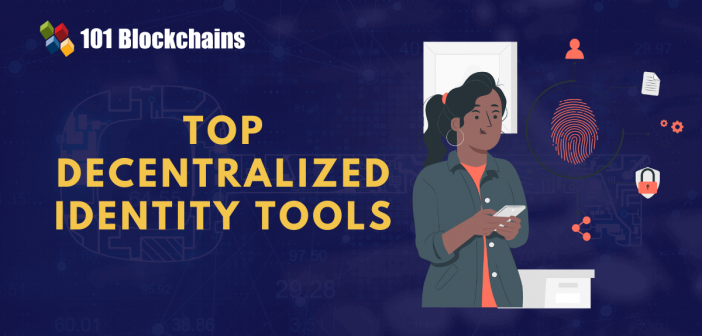Learn how blockchain truly works, master key definitions, and uncover what makes smart contracts so "smart." Dive into the fundamentals, gain valuable insights, and start your blockchain journey today!

Guides
James Howell
on April 24, 2023
List of Top 20 Decentralized Identity Tools
Decentralized identity solutions have evolved as prominent players in fuelling digital transformation with an efficient and secure approach to digital identity management. As a matter of fact, the number of decentralized identities worldwide will reach almost 1.5 billion by 2026. As of 2022, the global decentralized identity market was worth $0.65 billion and could reach $3.5 billion by 2025. The top decentralized identity tools have found applications in different industries, such as finance, education, governance, and healthcare. Most of the decentralized identity solutions utilize blockchain technology to facilitate security for storing and managing data. Decentralized identity or DID tools have successfully raised more than $1 billion for funding. On top of it, the average cost of developing a decentralized identity solution can reduce by almost half by 2026.
The review of important statistics about the landscape of decentralized identity tools shows how the decentralized identity market is prepared for growth. More than 30% of companies are likely to use blockchain-based decentralized identity solutions by 2025. Problems for data security and privacy, alongside pressing challenges for efficiency in centralized identity systems, establish stronger reasons for adopting decentralized identity solutions. The following post offers an outline of the most popular tools you can use for the benefits of decentralized identity.
Excited to learn the concept of decentralized identity on existing digital ecosystems? Join Yearly/Yearly+ Plan and get free access to Decentralized Identity Fundamentals Course Now!
Necessity of Decentralized Identity Tools
The concept of decentralized identity presents significant improvements over centralized identity management systems. Decentralized identity allows users to exercise comprehensive control over their personal data and the ways in which it is used. With the help of best decentralized identity tools, you can have relevant credentials, identifiers and data in a digital wallet.
As a result, users can take control over their identity alongside providing privacy protection. Decentralized identity also introduces blockchain technology for reducing the potential risks of data hacks and breaches. The lack of a single point of failure, as in a central database, removes the possibility of exploitation by hackers.
Before you review the most popular decentralized identity tools, you need to take a look at the following use cases of decentralized identity.
- Self-sovereign identity for individual users.
- Decentralized finance or DeFi.
- Digital identity verification.
- Voting and elections.
- Supply chain management.
- Decentralized social network access.
- Access authentication and control.
- Digital identity for education and e-learning.
Want to learn and understand the scope and purpose of DeFi? Enroll Now in Introduction to DeFi- Decentralized Finance Course
Most Notable Decentralized Identity Tools
The rapid expansion of the decentralized identity ecosystem has opened up new prospects for introducing new DID tools. Some of you might wonder about answers to “What are decentralized identity tools?” and how they can help. The basic definition of DID tools describes them as applications that can help you leverage the benefits of decentralized identity. Here is an outline of the top tools in the decentralized identity ecosystem and their functions.

Please include attribution to staging2.staging2.101blockchains.com with this graphic. <a href='https://staging2.staging2.101blockchains.com/blockchain-infographics/'> <img src='https://staging2.staging2.101blockchains.com/wp-content/uploads/2023/03/Top-Decentralized-Identity-Tools.png' alt='Top Decentralized Identity Tools='0' /> </a>
1. Stripe Identity
Stripe Identity is a decentralized identity tool that can help you verify the authenticity of different ID documents across over 33 countries. It is one of the popular decentralized identity tools which helps in programmatic confirmation of user identities to prevent fraud. At the same time, Stripe Identity can also help in reducing friction for customers. The Stripe Identity solution helps developers in supporting KYC rules and detection of fake IDs through advanced machine learning.
2. Nametag
Nametag is another prominent addition to a decentralized identity tools list suitable for decentralized social networks. It can serve as a decentralized social media profile for users, which can help in connecting web3 and web2 service accounts. The Nametag profile can help in connecting multiple wallets across different chains and creating your own gallery. Subsequently, you can port the profile across popular applications such as YouTube, Discord and Twitter. In addition, you can also port your profile into web3 games, metaverse platforms and blockchain-based experiences.
3. Fractal
Fractal is also a popular DID tool that serves as a crypto-native identity provider. It has almost 1 million re-usable verified identities alongside over 160 dApps using the tool. Fractal is a significant choice from the list of decentralized identity tools for user authentication.
The platform offers the facility of onboarding for different compliance-related use cases, such as KYC checks or KYB verification. Interestingly, the tool covers all types of KYC verifications in one specific price plan. Furthermore, the liveness solution of Fractal helps in verifying the eligibility of users for specific events such as participation in crypto games or crypto airdrops.
4. Polygon ID
The next addition to a list of DID tools would point at Polygon ID, which leverages a decentralized identity system. It helps in creating trusted communications with different web3 services. The best highlight of Polygon ID as one of the top decentralized identity tools draws attention toward its founders.
Created by the team behind the Polygon blockchain, Polygon ID delivers a decentralized identity tool with the benefits of programmable privacy. As a result, users can interact with different web3 services of their choice in a decentralized and privacy-centric manner. Polygon ID also leverages zk-SNARK technology for facilitating cryptographic safeguards.
Excited to develop a comprehensive understanding of Polygon? Join Yearly/Yearly+ Plan and get free access to Polygon Fundamentals Course Now!
5. Skiff
Another notable addition to the collection of DID tools would refer to Skiff. It is an end-to-end decentralized workspace with the benefits of encryption for effective collaboration and communication. The reputation of Skiff as one of the notable decentralized identity tools is evident in the facility of a wallet-native workspace with an emphasis on privacy. Skiff includes essential workspace functionalities such as pages, mail, drive apps, and calendar.
6. KYCDAO
The unique entries among DID tools in 2023 also include kycDAO, which has earned a reputation for introducing web3-native compliance services. It works as a multi-chain platform to issue reusable and on-chain KYC verifications. KYC NFTs on the DAO could offer a trusted approach for identity verification across different use cases, such as founder verification, fundraising, investment and governance. Users could also mint KYC NFTs to multiple wallets by proving ownership of the different wallets.
7. Disco
Disco also qualifies as one of the top entries among the best-decentralized identity tools for pseudonymous identification services. The most striking advantage of Disco reflects the flexibility for taking your credentials anywhere you want. Disco offers a chain-agnostic decentralized identity tool and leverages decentralized identifiers alongside verifiable credentials for data ownership. The platform works by grouping personalized data of users, which the users can choose to share with verifiers.
Excited to develop fluent knowledge of the DAO ecosystem? Join Yearly/Yearly+ Plan and Enroll Now in DAO Fundamentals Course!
8. Spruce
Spruce ID is one of the most renowned DID tools, which offers a collection of open-source tools that can help users in taking control of their identity. The reputation of Spruce as one of the popular decentralized identity tools is evident in the facility of multiple decentralized identification tools. Some of the notable tools available on Spruce include cryptographic credentials for social media and credential-based wallets. The platform aims to empower users with control over their data through decentralized identifiers, such as Ethereum wallet addresses.
9. Galxe
The choice of important tools for decentralized identity also invites additions such as Galxe. It can offer an accessible credential infrastructure for web3 developers. The platform is creating a credential data network that can address the requirements of on-chain as well as off-chain communities.
Galxe is an innovative addition to a decentralized identity tools list for helping users in curating and contributing digital credentials to the specific network. In the case of on-chain credentials, Galxe uses static snapshots or subgraph queries. On the other hand, Galxe leverages data sources from different organizations, such as Github, Snapshot, and Twitter.
Excited to learn the basic and advanced concepts of ethereum technology? Enroll Now in The Complete Ethereum Technology Course
10. Bright ID
Bright ID is a promising example of DID tools aimed at the future of web3. It is a social identity network that attempts new approaches to identity verification for social media. Bright ID is a reliable addition to a list of decentralized identity tools which leverages non-invasive and open-source decentralized technology. It can help users in proving that they don’t use multiple social media accounts. Bright ID creates proof of unique identity by developing and analyzing a social graph.
11. Phi
The innovative examples of tools for decentralized identity also include choices like Phi in the web3 ecosystem. It works by generating virtual lands which can represent the on-chain activities of users. Phi offers a metaverse virtual land system that can generate virtual land parcels according to universal web3 components, such as wallet activity and ENS domains. The platform offers unique answers to “What are decentralized identity tools?” by bringing the metaverse into play. Phi plans on filling up the virtual land parcels with unique digital assets that represent the on-chain activity of users.
12. Verite
Verite is another interesting entry among the popular tools in the decentralized identity ecosystem. The platform can help in the verification of web3 identity claims without the need for disclosing personal information. It offers a comprehensive identity verification tool for smart contracts, web apps and mobile apps without exposing sensitive personal information. In addition, the platform also helps in controlling the approaches, location, and timing of sharing identity attributes. The composable tools on Verite can also help in issuing and verifying credentials alongside developing solutions for improving privacy.
13. HashKey DID
The HashKey DID is a phenomenal cross-platform identity authentication verification tool. It has around 840,000 users and more than 8 million community members. HashKey is one of the most popular decentralized identity tools which can help transform the authentication and verification landscape.
Another highlight of HashKey refers to the secure collaborations with multiple brands, which enable easier KYC integration. On top of it, the comprehensive software development kit with detailed documentation and an effective API interface can help developers.
Curious to understand the complete smart contract development lifecycle? Join Yearly/Yearly+ Plan and get free access to the Smart Contracts Development Course Now!
14. xHashtag
The overview of top tools in the decentralized identity ecosystem would also include xHashtag, an emerging protocol for web3 reputation. On-chain reputations are vital in the world of web3, which you need to prove through credentials. xHashtag serves as an effective solution for stacking up and obtaining on-chain credentials. The “.soul” domain name helps in representing proof of on-chain activities of users through soul-bound NFTs.
15. WIW
The next addition to web3 identity and reputation management protocols is WIW. It is one of the best-decentralized identity tools which utilizes zero-knowledge-proof technology. The ZKP technology helps safeguard the identity of users alongside managing their on-chain reputation. WIW works through the storage of user data on decentralized file storage systems, such as IPFS. The platform offers a search portal where you can find details for the profile tag of any user. As a result, it can help in verifying the on-chain reputation of all users.
Curious to learn about the value advantages of ZKPs for blockchain security? Join Yearly/Yearly+ Plan and get free access to Zero Knowledge Proofs (ZKP) Masterclass Course.
16. DSI Protocol
Your search for the best tools in the decentralized identity ecosystem right now would also land up on the DSI protocol. It serves as a comprehensive decentralized protocol for data management and ownership. The DSI protocol serves as a prolific choice for obtaining complete ownership and privileges for accessing on-chain and off-chain data. DSI protocol can help users in storing and managing their web3 credentials as well as DeFi portfolios with ease.
17. zCloak Network
The zCloak network offers the zkID Login tool to help users in achieving a considerably explicit, faster and private mechanism for logging into specific services. It is one of the top decentralized identity tools with the advantage of multi-chain compatibility. As of now, zkID Login is accessible in the form of a browser extension and allows users to store verifiable credentials in a dedicated wallet.
Want to explore in-depth about DeFi protocol and its use cases? Join Yearly/Yearly+ Plan and get free access to Decentralized Finance (Defi) Course- Intermediate Level Now!
18. Iden3
The collection of the most popular tools in decentralized identity also points to choices such as Iden3. It utilizes the Ethereum blockchain as its foundation and has achieved significant milestones in the domain of decentralized privacy. The decentralized identity tool utilizes zk-SNARK technology to protect privacy. In addition, the native naming service of Iden3 also helps in anonymous on-chain activities. Most important of all, Iden3 also offers the flexibility of scaling to layer-2 solutions for facilitating better accessibility.
19. Walt ID
Walt ID also deserves a special spot among the most notable decentralized identity tools for offering the services of decentralized identity alongside NFT and wallet infrastructure. The SSI Kit of Walt ID offers a flexible and convenient approach for leveraging Self-Sovereign Identity or SSI. In addition, Walt ID also provides an IDP Kit, NFT Kit, Storage Kit and Wallet Kit.
20. Violet
The final addition to the decentralized identity tools list would refer to Violet. It is a comprehensive platform for the management of identity and regulatory compliance. Violet has emerged as one of the dominant dApps for ensuring better efficiency in managing regulatory compliance and identity. Most important of all, Violet can capitalize on the technicalities of zero-knowledge proofs to ensure privacy for users. At the same time, seamless off-chain data storage systems ensure the safety of the data of Violet users.
Conclusion
The introduction to decentralized identity provides a set of clear reasons for learning about tools in the decentralized identity ecosystem. Awareness regarding answers to “What are decentralized identity tools?” can support users in checking out the best alternatives. However, it is also important to note that each decentralized identity tool has a distinct functionality.
Therefore, you have to be careful in choosing a decentralized identity tool for a specific use case. The most interesting highlight of the emerging array of DID tools is the flexibility for using digital identities across various decentralized spaces. Learn more about decentralized identity fundamentals and the advantages of decentralized identity for the future of technology right now.
*Disclaimer: The article should not be taken as, and is not intended to provide any investment advice. Claims made in this article do not constitute investment advice and should not be taken as such. 101 Blockchains shall not be responsible for any loss sustained by any person who relies on this article. Do your own research!








